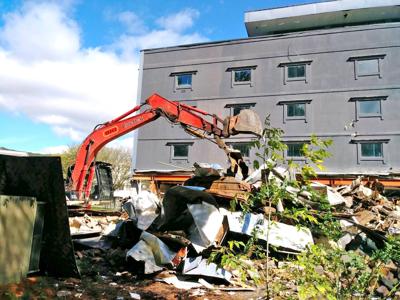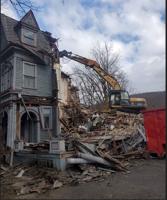Oil City saw a lot of changes in 2024, most notably demolition of the former Days Inn and the closure of Veterans Bridge for much of the summer.
The city also raised taxes by 1 mill in December after roughly a decade without a tax increase.
When Veterans Bridge was closed for maintenance from the beginning of June until shortly before the start of school in August, traffic backups were typical during peak hours. That required a number of festivals, including aspects of the Oil Heritage Festival, Jolly July 3rd fireworks and Bridgefest to be relocated.
The project focused on repairs to the upper portion of the structure, including the concrete bridge deck, barriers, abutments and piers.
Work included replacement of the expansion joints and upgrades to lighting, signs and pavement markings.
Contractor for the work was Swank Construction Co., of New Kensington. The contract cost $2,698,163.90, which was entirely paid for with federal funds.
During July, the New York and Western Pennsylvania Railroad upgraded the railroad crossing on Elm Street, near McDonald’s.
In other city news, the city’s 2024 street paving contract was awarded in April to the low bidder, Valencia-based Shields Asphalt Paving, at a cost of $406,593.
Over the course of 2024, the city installed 18 security cameras along the West End trail, from the marina to the wastewater treatment plant, and on City Hall.
In August, the bid for the demolition of the former Days Inn hotel was awarded by the Oil Region Alliance of Business, Industry and Tourism to Bert Klapec Inc., which submitted the low bid at $345,000. Demolition began in September and continued for about a month.
The next step, now that the hotel has been demolished, City Manager Mark Schroyer said, is to advertise the property for development.
The city, in partnership with the ORA and the Oil City Redevelopment Authority, acquired the vacant, dilapidated hotel in November 2023 from Oil City Hospitality LLC, which is run by the Shah family.
By the time the issue was settled and ownership transferred, the cost was about $525,000, Schroyer said at the time. The purchase price was $499,000; the rest of the money was for settlement and legal costs.
City Hall renovations
The city appropriated more than $1 million from the sale of bonds issued in 2021 for City Hall renovations, and much of that money is required to be spent by the end of 2025.
In June, Homan Specialty Roofing, of Oil City, submitted the only bid to redo the roof of city hall. The bid came in at $196,500, which was a little less than expected, according to Schroyer.
The entire roof was replaced in August and September. A new boiler, upgrades to the HVAC system and new flooring in the police department were among other renovations.
Once the weather breaks in April or May, Schroyer said, the plan is to clean and spruce up the exterior of City Hall, which will largely conclude the renovations at this time.
2025 budget
During its last public meeting of 2024, council unanimously passed the 2025 city budget, which includes a 1.08-mill property tax increase.
Property tax in Oil City will go from 11.92 mills, where it has been for about a decade, to 13 mills in 2025, a rate that translates into a tax bill of $13 on each $1,000 assessed valuation of taxable property, according to the budget.
That translates to an increase of $54 for an average household with a property assessed at $50,000.
Schroyer said in December when the budget was passed that the changes since the $31,615,147 spending plan was presented “have been minimal.”
The property tax millage for 2025 breaks down to 9.18 mills for the general fund; 2.45 mills for the operation of the city’s parks, playgrounds and recreation areas; 0.99 mill for the library; and 0.39 mill to pay interest and principal on indebtedness.
City funds are earmarked for utility and refuse services, general control, parking, liquid fuels, capital reserve, community development, the industrial park and the Oil City Arts Council.
In addition to the property tax, the budget also will rely on the $10 per capita tax, 1% earned income tax, 1% realty transfer tax, $52 local services tax, $5 residence tax and business license fees that range from $25 to $100.
Games of skill
After several months of discussion, council passed a games of skill ordinance in November by a 3-2 vote, levying a fee on skills games machines in establishments within city limits.
The ordinance, which went into effect in January 2025, includes a $300 flat fee for each games of skill machine.
Council members Mike Walentosky, Dale Massie and Mayor John Kluck voted for the ordinance.
Council members Ron Gustafson and Matthew Craig voted against it, as they had on previous readings of the ordinance.
Junior Council program
One of Kluck’s first actions as mayor in January 2024 was to create a Junior Council program, which City Council unanimously approved in February of that year.
The program is open to all high school juniors or seniors who live in the city. One junior and one senior were to be chosen from all the applicants.
After interviewing sophomore Clarice Carlson and juniors Jackson Dilks, Seth Swidorsky and Lily Szekeres in March, council ultimately decided to appoint all four of those Oil City Area High School students to the seats.
Since then, Dilks and Carlson have been very active Junior Council members .
Junior council members are expected to attend the twice-a-month council meetings during the school year. Though not required, they are encouraged to continue to attend meetings during summer.
They are allowed to attend all council meetings and committee meetings, but may not vote or attend executive sessions. The students don’t receive compensation.
Water Department
Beginning in January 2024, Water Department Director Jason Herman regularly updated council on new state rules affecting lead and copper pipes, and water testing that will result in a significant change and expense to the city.
As part of the endeavor, city water employees manually tested all of the roughly 4,000 active water meters in the city.
The city was required by Oct. 16 to have a complete inventory of all the water mains and service lines in the city and the materials that comprise them.
The city also is mandated to come up with a plan for complying with regulations that must be submitted to and approved by the Environmental Protection Agency.
The city’s water, utilities and engineering departments worked on the project during 2024, which has required, among other things, going through the city’s records of waterline repairs and replacements as well as meter replacements since the 1960s.
Parks
In July, council awarded the bid for the stormwater maintenance project in Justus Park to Horizon Construction Group.
Work got underway in early August and wrapped up at the beginning of September.
The total cost of the project was about $120,000, Oil City Community Development Director Kelly Ryen said in August.
The costs were covered by funding from the Robert H. Reakirt Foundation, as well as a Northwest Greenways Grant through the state Department of Conservation and Natural Resources and the state Department of Environmental Protection, she said.
In other news, after a long process, the city finally obtained ownership of the Hasson Heights ballfield in December. The ballfield was part of the former Oil City National Guard armory property in Hasson Heights.
Venango County now owns the rest of the armory property, which will be turned into a new 911 and emergency services center.
Union contracts
In October, after getting through the negotiation process, Oil City and the union representing the police department officially agreed on a three-year contract, Schroyer said at the time. The old contract ended Dec. 31.
The contract includes annual wage increases, the breakdown of which, according to Schroyer, was 3% in 2025, 3.5% in 2026 and 4% in 2027.
“They will be helping out with health insurance premiums and some other little things,” Schroyer said at the time.
In November, the International Brotherhood of Electrical Workers, the union that represents Oil City’s public works, water and sewer department employees, as well as some clerical staff, rejected the proposed contract with the city, Schroyer said.
He noted in January that there has since been little discussion, and the contract is something that will have to be worked on during the first quarter of 2025.
The contract for Oil City firefighters, who are part of the International Association of Fire Fighters union, will be up at the end of this year.
Personnel changes
- City Council — In February, longtime council member Ron Gustafson was appointed to fill a vacancy on the board. The vacancy was created by Nick Moran’s resignation halfway through his four-year term. The remainder of the term runs until December 2025.
- Police chief — Cory Ruditis was appointed as Oil City police chief beginning July 1. Dave Ragon, the former chief, retired at the end of June.
- Fire chief — Tim Alex succeeded Derek Long as Oil City fire chief in June when Long retired.
- Assistant city manager — In May, Michelle Hoovler, the city’s finance officer, became assistant city manager in addition to her other duties. In April, council voted to bring back the position of assistant city manager, which had been done away with in 2010.
- City controller — Judy Tenney was hired as city controller in July after the announcement that Robert Cross would resign, effective Aug. 1.
With the municipal elections of 2025, two council seats will be up, as well as those for city treasurer and city controller.
While not an elected position, Oil City also will soon have a new city manager as Schroyer is planning to retire in 2025.
Plans for 2025
During 2025, Schroyer said, the plan is to revisit the Allegheny River waterline crossing project and the city’s downtown parking issues, both of which have been on the back burner since the COVID-19 pandemic hit in early 2020.
The city is still in discussions with the EADs Group, which proposes boring under the river to lay a new waterline.
This project comes after the previous attempt to bore under the river in 2019 was halted when the installation of a new waterline beneath the river was unable to be completed by Pulaski-based Mortimer Excavating.
The lines in the river were planned to extend from the Industrial Park in Siverly to Pumphouse Road in the East End.
There are three options for the waterline: boring under the river, trenching the river or hanging the waterline off of a bridge, Schroyer said.
The waterline project, he said, could happen in 2025 and would be one of his final projects as city manager.
The parking situation in Oil City is also on the agenda for 2025, Schroyer said. His view is that the city’s role is to provide downtown parking for businesses and organizations, but it is not required to provide parking for the employees of downtown business.
Employees of downtown businesses are encouraged to park in outlying permit parking, he said.
During 2025, Schroyer said the city will continue to “reinvest in infrastructure, plant and equipment.”
The city will be undertaking about $500,000 in paving in 2025 as well as in-house waterline projects, Schroyer said.
The Blizzard lot, near Country Fair on the North Side, will be paved and the lighting updated, he said.
The city also will continue to work with the land bank and the redevelopment authority to acquire and demolish blighted buildings in Oil City, Schroyer said.












































